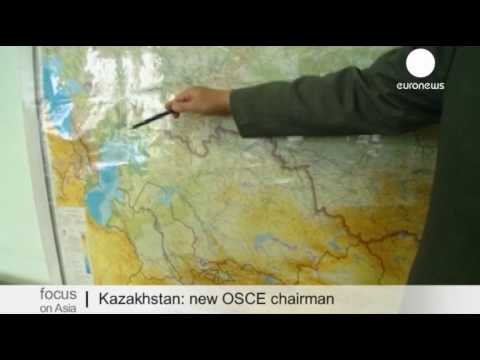So you think you have snow problems? Kazakhstan has them in spades, every year, but this young republic is used to clearing obstacles, and has now become the first ex-Soviet state to lead the Organisation for Security and Cooperation in Europe. It is another tick on the central Asian state’s ambitious checklist.
Astana, the equally young capital, would like to pull off a summit of all 56 OSCE leaders, something they have not been able to agree to for over a decade.
The 10-year gap has seen growing distrust between member states and has thrown the OSCE into crisis, making it unable to solve the region’s most pressing issues, says new OSCE chairman-in-office Kanat Saudabayev;
“Our presidency falls at a difficult period in the OSCE. Unfortunately, the situation in the zone of responsibility of this organization not only didn’t improve, but became even worse in the years since the last summit. Not only the existing conflicts weren’t resolved, but, unfortunately, a lot of new global challenges have appeared – these are problems that must be examined by the leaders of OSCE member States. And one of the main topics would, of course, be Afghanistan.”
Bigger than the whole of Western Europe, Kazakhstan is well-placed to influence the Afghan deadlock and other conflicts that run along central Asia’s borders.
It is a potential cornerstone of regional security, according to the director of the country’s main national think tank, Bulat Sultanov;
“If we look at the map we see that Kazakhstan could act as an outpost of the OSCE, of the European Union, protecting them from the threats and challenges that are coming from the so-called arc of instability. These are, first of all, drug trafficking, illegal immigration, religious extremism, and terrorism.”
Kazakhstan has abundant mineral and fossil fuel resources, so the world’s largest land-locked country and ninth biggest overall has a clear priority: developing large-scale infrastructure projects which it expects will benefit regional economic security.
“Kazakhstan occupies a perfect geographical location between East and West, between Europe and Asia, being an Eurasian state. Therefore, it is now aiming to restore the Great Silk Road, it has begun construction of a China-Kazakhstan-Russia-Belarus-Poland motorway and beyond, into Western Europe. It also favors the construction of oil and gas pipelines from Central Asia in the Chinese direction,” says Sultanov.
Still, the nomination of Kazakhstan as the OSCE chair raised controversy when non-governmental organizations slated its rights record.
Local activists claim civil liberties, press freedom and the judicial system are getting worse, not better.
Formerly the sole opposition senator Zauresh Battalova now leads NGO the Public Foundation for Parliamentary Development:
“In Kazakhstan, a number of political opponents have been killed, a number of journalists put under pressure or murdered, and opposition newspapers are subjected to constant hardships. Today we see heavy pressure on independent human rights defenders. And Kazakhstan being the president of the OSCE, while having failed in many respects to arrange its laws to meet international standards is, in my opinion, a serious problem for the people of Kazakhstan and for the OSCE itself.”
Officals plead they have enjoyed 20 years of stability under President Nursultan Nazarbayev, and insist authoritarianism is giving way to democracy and rights protection according to Kazakhstan’s specific regional and historical context. The year of the OSCE presidency may just be the best time for the nation to lead by example.





